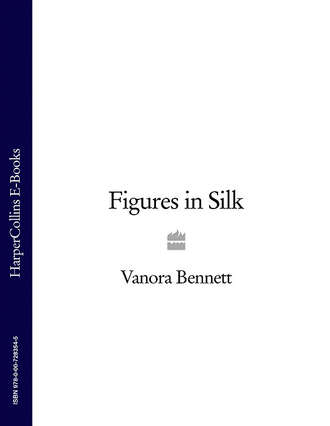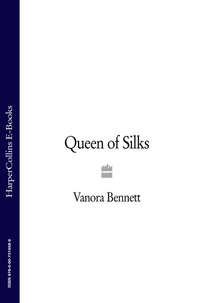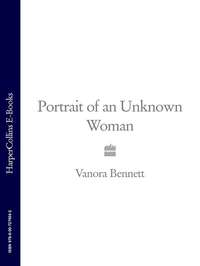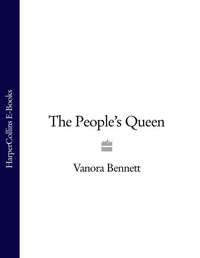
Полная версия
Figures in Silk
He didn’t notice her gesture. ‘Well, we survived. But we’ve been unlucky ever since with our marriage choices,’ he was saying, with a twist to his mouth that made his face look pinched and hard. ‘My eldest brother ran away with a war widow, the stupidest possible love match, just when what family we still had was finally arranging a proper alliance for him. We’re only just seeing the end of the years of hatred that brought. And then a second brother married to spite the eldest brother, deliberately going against his wishes. And that’s meant more trouble…’
He sighed and looked down at the neat meat squares his hands had been cutting as he talked, and pushed one gently towards himself with his knife. Then he stabbed it. Isabel took another sip of rough dark wine as it disappeared into his mouth, wondering which brother he’d been thinking of when he’d made that stabbing movement. ‘I’m glad it’s over now,’ she ventured, glancing up, ‘your family trouble, I mean.’
Perhaps it was the smallness of her voice that made his eyes gentle again.
‘Almost over,’ he corrected, looking properly at her once more. ‘There’s still my marriage to arrange.’
For a second, his voice was so tender that her heart leapt. She caught her breath, leaning eagerly forward behind her cup. Then she felt a sigh ebb out of her as he went on, more harshly: ‘And now it’s my turn there’s nothing I want more than to make a marriage that will be good for my family – but my second brother’s trying to stop me. He’s fighting it so hard that I think even my trying to do the right thing might turn out to be the wrong thing. I’ve found myself thinking I should pull back… to satisfy him.’ His jaw tightened, as it had in church. ‘I’m not going to, though,’ he added firmly. ‘That wouldn’t help either. But I sometimes wonder if we’ll ever stop being orphans at war, wilful children in men’s bodies, destroying each other while we try to sort out the things our father should have decided.’ He sighed. ‘You can see why I believe there’s nothing more important than marrying in the best interests of your family, can’t you?’ he added with more energy. ‘You have to work together, do your duty; or you’re lost.’
‘Oh,’ Isabel muttered lamely. There was another long silence, broken from somewhere behind by a roar of male laughter. The girl cleared away their boards. Isabel noticed that the light was failing. The window was still bright, but his face was falling into shadow. She hadn’t heard the bell; but the markets must be closing.
He was sitting very straight and apparently still on his stool. She felt, rather than saw, the tiny movement of his hand twitching at his sword hilt. She remembered peeping sideways at his hands in the church: they’d been brown and well-made, with thin fingers, with bitten nails.
She wanted to ask: ‘Do you love her?’ But she sensed that was a question girls giggling in silkrooms might ask, and not for him. Instead, she faltered, ‘But don’t you ever wish…?’ and left the question hanging. She didn’t know herself how she’d have finished it.
When his voice came out of the gloom again, it was wistful and there was no flash of eyes; he must be looking down.
‘Ah, wishes…’ he whispered back. ‘If we could live by our wishes… please ourselves: live at peace, kill nothing but dragons… eat buttercups… ride unicorns… who knows what any of us would do?’
She heard a quiet rumble of laughter. She could see the ghost of the evening star through a smeared window pane. She put her cup down and left her hands spread on the table. She looked at the two pale shadows on the dark wood: fingers long and lovely enough to embroider church vestments with, as her father liked to say. The question flashed through her mind – was he looking at them too? – as she thought, all I want is to go on sitting here in this darkness; not to talk; not to think; not to go home.
‘Of course, you don’t have to take my advice,’ he said in the end. When she looked up his eyes were gleaming quizzically at her again over steepled fingers, his long eyes the only clearly visible part of his shadowed form. ‘If you have choices, that is.’
‘Choices?’ she repeated dully, as reality came back like a sour taste in the mouth. Knowing that her father wouldn’t let her run away from marrying Thomas Claver by paying her dowry to a nunnery instead, since she’d never shown the least sign of having a vocation; wondering if she’d have the nerve to risk walking out of his great place, where she’d always been Miss Isabel, daintily perched on wallows of silk, sewing altar cloths, to become a withered, unregarded, unmarried housekeeper in the household of the kind of wealthy wife Jane would become. Knowing she wouldn’t. Aware too that there were other, worse possibilities that her imagination was shying away from. ‘What choices?’
He glanced over at the chessboard and grinned. ‘Strategic choices,’ he said, with a return of the wolfish energy she’d glimpsed as they left the church. ‘You mustn’t think life is a romance; that some knight errant will come along and slay the dragon for you. Knights don’t really sit and pine at lovely ladies’ gates. They fight. That’s reality. War. Chess. All you can do is plan as many steps ahead as you can and position yourself for a good move next time. Know what your powers are and what you can do.’
Briskly, he shook out a couple of pieces. ‘Look. Say I’m a king: I can move in several directions. If the way I want is blocked, there are others open to me. But let’s call you a pawn. You don’t have so many choices. All you can do is move forward, one step at a time. And I’d imagine your only forward movement now is to say yes.’
She glanced up; down, at her fingers, plucking at each other; up again through her eyelashes, seeking his eyes but hiding hers when she met them; not wanting to acquiesce. How could he look so soft, but be so hard? Was that what the war had done to him, or just his nature? She didn’t want to accept that her dilemma could be reduced to this ruthless balancing of possible outcomes; this cold-blooded comparison of disadvantage. All she wanted was to come up with some way of talking her father out of his foolishness, she thought; ready to toss her head like an impatient pony, but restraining herself just in time, with the dawning awareness that there was no place left in her life for petulance. Her father wasn’t going to change his mind.
‘Well?’ the man in front of her murmured. His voice might be soft, but there was no ignoring the challenge in it. ‘Do you have any other choices?’
She shook her head, filling up inside with a darkness that crawled and churned.
‘You’re young,’ she heard him add. She thought she heard sympathy. ‘Take the long view. This is only your first move. You’ll get more chances later.’
The serving girl was lighting candles in the back vaults; people were crowding in from the markets. She couldn’t bring herself even to nod. Forever yawned ahead of her fourteen-year-old mind like a pit. She got up. Wished she had a cloak to wrap carefully around herself. It would be cold outside. There was nowhere to go but home.
‘Thank you for your company,’ she muttered, staring at her feet, and turned to the door.
He was on his feet in a dark whirl; beside her, a hand on her back. ‘It’s not easy, I know,’ he whispered. ‘I was lucky we met today: you’ve helped me see what I should do. So thank you. And good luck. I hope I’ve helped you do the right thing too.’
She was aware of his downturned face just above hers. From very close, she became conscious of his arm stretching around behind her; of long lean muscle and the dizzy moving together of bodies. Or did she misunderstand? Before she quite knew what was happening, it wasn’t happening any more. He was striding off very fast towards the serving girl, in her pool of candlelight, feeling down his leg for a purse; glancing briefly back at her, still with those half-closed, intent eyes; muttering, ‘Goodbye, Isabel.’
She stood there for a moment more. Astonished; still feeling the heat of his hand on her skin. Watching his retreating back. Then she braced herself for the evening chill, and walked out into the starlight. She thought she glimpsed him turning back round to watch the door swing shut behind her, but she couldn’t be sure.
Every step she took back towards her home felt harder. Every dutiful footfall was heavier. That last moment was still with her, mixed up with the wind flapping at her skirts. It stayed with her like the eye’s long memory of flame: the man with the soft eyes and the hard mind looking back at her over a lean shoulder, then moving away so fast that the candles silhouetting his form shrank back as if a dark wind was blowing at them, murmuring goodbye in his black velvet voice. His hand on her back. She didn’t even know his name. She’d never see him again. It would have to be enough that for an instant they’d drawn so close she’d almost felt the heat of his body on hers. Even the possibility of one day feeling that radiance again, of being transformed like a wisp of silk lit up by the sun, might help to sustain her through the drab future her father was planning for her.
2
Isabel married Thomas Claver a week later, on a bright April morning, on the steps of St Thomas of Acre. The little people squinting across Cheapside to the church door smiled at the sight while they filled up their buckets at the water conduit, or popping heads out from one of the many covered markets behind the Mercers’ thoroughfare and the cramped stalls lining the road, where low-ranking silkwomen doing needlework or weaving or throwing or twisting threads craned their failing eyes to watch the world go by as they worked. A couple of crones poked each other and cheered the little procession on to the door, with the mocking laughs of the old. But all they probably noticed was John Lambert, in his mercer’s blue velvet livery robes trimmed with fur, looking as magnificent and proud as a prince between the two young female forms whose future he was settling.
Isabel’s heart was beating so loud she was breathless with the boom and thud of blood in her ears. It was all she could do to stop her own small, unimpressive, down-covered limbs, so like her dead mother’s had been, from trembling, and her freckled face from showing fear. When she’d looked into her mother’s beaten copper mirror before leaving, the dark blue eyes in the face that had stared back from it had been wiped of their usual intent, good-humoured look. There was no sign in that face that its owner was usually chatty and bright and asked inquisitive questions about everything she saw. There was none of the charm in those neat, symmetrical features that often made people look at her with the beginning of a shared smile, even if she wasn’t trying to beguile them. The face looking back at her now didn’t seem pretty: just quiet, even placid. Her red-gold hair was smoothed neatly away under her veil. It was the best display she could manage in the circumstances.
She couldn’t look at Jane, as slender and golden as ever. Jane was dressed exactly like Isabel in one of the yellow gowns embroidered with silk flowers in which John Lambert had displayed them on his retail stall in the biggest market, the Crown Seld, whenever he made them sit there, embroidering the heavy orphreys that would later border extravagant church vestments. (The sight of the two girls, so fresh and pretty, was supposed to draw in passing trade; Isabel had spent her life complaining that she wanted to do more than just sew while she was working in the seld, but her father had always been adamant – embroidering church vestments was the only suitable part of the mercer’s trade for a young lady of her stature.) Jane was her father’s daughter even now, down to the emerald-green eyes and noble profile and air of perfect composure under pressure. Isabel shrank into herself as she peeped at her sister, wished she could look so self-assured. Isabel couldn’t look at the bridegrooms – Will Shore, somewhere over there on the edge of her field of vision, behind Jane, a shy beanpole in violet hose, and Thomas Claver, thick-set and reddish-haired, next to her. In Thomas’s case, though, she was at least aware of his eyes darting between the watchers and her father and his own tub of a mother, whose reddish face was cheerful above her serviceable dark clothes. John Lambert had wondered aloud more than once in the past few days whether Alice Claver – who was famously not one for ceremony – would have the decency to dress appropriately for the occasion. She’d lived down to his expectations, wearing only her usual market clothes with a bright blue cloak wrapped over them, as if she’d hastily borrowed some of her stock for the day, or was expecting rain. If anything in the assembly of people Isabel couldn’t look at now gave her comfort, it was Alice Claver looking scratchy and uncomfortable in that dressed-up cloak.
There hadn’t been much time for Isabel to get used to her situation, what with King Edward’s army entering the City and the curfew being moved to before sunset, just in case, and her father being called on to head one of the city patrols watching the soldiers to prevent outrages against the citizens. At the end of the first day, when people had begun to relax a little, as they saw this army, now mostly camped outside the walls in Moorfields (with just a few hundred lodged in Baynard’s Castle, the riverside family home of the dukes of York), was not going to make trouble, and as eager vintners and fishmongers rushed to make contracts to supply the soldiers until they left to march north again, an agitated John Lambert had got the call to join the King and his generals at the thanksgiving Mass they were holding at St Paul’s. His delight at that almost compensated for being left out of the farewell banquet at Baynard’s Castle last night, at which the mayor had been allowed to serve the King’s wine. And his preparations for being briefly in sight of the court had overshadowed the planning for the weddings.
With so much going on, John Lambert had only had time to take Isabel once to the Claver house on Catte Street, a great place whose airy halls and parlours put to shame even the substantial Lambert family home round the corner on Milk Street, even if it wasn’t decorated with half so many tapestries and carpets as the Lambert house. It was in the morning of the day the gates were opened to the army. He was already in his harness ready to ride out with the patrol. He’d hastily sorted out the business side of the marriage with Alice Claver, at one end of the great hall, in the space of an hour, while the betrothed couple had been given a brief chance to get to know each other, sitting awkwardly on benches drawn up across from each other, at the other end of the room.
It had taken Isabel what seemed an eternity to find the strength to raise her eyes. When she did, she’d been astonished by the picture the young man opposite her presented. He wasn’t slurping at the cup of wine his mother had left by his side before tactfully drawing away. He was slumped on his bench, with his pink face in shadow under hair that wouldn’t lie down. He was staring at his feet, pulling at the purse dangling down his leg with busy fingers, and biting his lip.
He looks scared to death, Isabel had thought suddenly, sitting up straighter with the realisation. More scared than me. He’d probably never succeeded in touching any of the tavern girls she’d seen him leering over in the Tumbling Bear and the Lion, she realised with a flash of intuition. This indulged only child of a rich widow, who’d never been sent to start an apprenticeship in another household, who’d been allowed to avoid learning his mother’s trade in her own house, was looking like a large child on the brink of tears. He’d almost certainly never been alone with a female of his own age. And now it was all catching up with him. She’d been surprised to find herself feeling something close to pity.
She’d leaned forward, wanting so much to comfort him that she very nearly patted his hand. But the only subject she could think of to break the ice was business. Her father had said Alice Claver was planning to buy her son into the livery and give him one thousand pounds’ worth of goods so he could bypass apprenticeship altogether – the ten years of study most boys did – and start trading on his own account as soon as he was married. They’d still have to live with his mother while he was setting himself up; but Alice Claver’s home contained so many leagues of rooms and halls that it would be no hardship. Perhaps Thomas Claver would be reassured by being reminded of his prospects, so glorious compared to the ten pounds here and five pounds there that so many young bachelors cadged from wherever they could to scrape together the stock they needed to start trading for themselves. It might make him feel in control of his destiny. ‘You must be pleased about getting into the livery,’ she’d ventured hesitantly, trying to form an alliance, doing her best at an encouraging smile.
But he’d only scuffed his feet against each other and scowled. ‘Oh, that. It’s just my ma pulling strings,’ he’d said sullenly. ‘It doesn’t mean anything. Doesn’t mean I’ll actually get to do what I want. She’ll have her fingers all over my business from day one, just you wait and see. “Thomas, do this; Thomas, do that; Thomas, don’t do that.”’ He peered up at last, but only to fix her with a look of gloomy malice before turning back down to his scuffing and scowling. ‘And it won’t be long before she starts in on you either.’
Isabel only knew Alice Claver by reputation. In the markets, the silkwoman was respected and mostly liked as a force of nature; a solid woman in her middle years with a wide face and a wider smile, when she chose, though she wasn’t scared of scowling or talking sharply either. Alice Claver whisked through the covered markets where she kept half a dozen retail stalls and booths and chests, selling whole silk cloths from Italy and silk threads from all over the world and the piecework ribbons and small goods that were made by her workers in London, jollying her own people relentlessly along, sweet-talking the mercers, and selling to clients with such down-to-earth persuasiveness that they hardly knew where they were before they were parting with their money. She hadn’t married again after her husband died, years ago. But she’d kept his business going. And she’d made enough money from carrying on Richard Claver’s trade in luxury goods to go on leasing the palatial great place they’d lived in together from the Mercers for what every silkwoman in the Crown Seld knew to be the princely annual rent of £8 13s 4d. She’d registered to trade in her own name, as a femme sole, taking responsibility for her own debts. She didn’t have John Lambert’s disdain for training girls – she trained younger silkwomen as if they were proper male apprentices, teaching them everything about how trade was conducted. The only thing the trained silkwomen couldn’t do was to join the Mercers’ Company; that was for the men; but they could set themselves up and, if things went well for them, keep themselves in style without depending on a husband. Things had gone well for Alice Claver. She sold fine silk goods to the King’s Wardrobe. She visited textile markets in the Low Countries and bought the finest cloths in quantities that were the envy of many merchants. She’d even organised the other wives of the silk business, and some of the most influential of their mercer husbands, to join her and the unmarried silkwomen in petitioning parliament to protect their trade from foreign competition. And she was the centre of charity around her home. She might not have much physical grace, but she had more energy than most women half her age – enough energy, Isabel thought with another surprised stab of compassion, to overwhelm a son with no great appetite for work.
So Isabel persevered with her smile. ‘Oh well,’ she said brightly, reminding herself that a soft answer turns away wrath, ‘we’ll see her off, don’t worry.’ She sounded more confident than she felt. Alice Claver would be hard to see off. ‘You’ll soon learn how to run things for yourself. And I can help. At least,’ she corrected herself, smiling a bit ruefully at the thought, ‘I can a bit. My father’s always refused to let the women in his family learn the business. He says it’s because he has his position to think of, and there’s no need now he’s so rich, though we know it’s really because my mother never knew enough about silkwork to teach us herself or hold her own in the selds, and after she died it would have meant losing face to change his ways and let us start learning. Anyway, he doesn’t like training girls too much. So all he’s ever let me do is embroidery. But I’m good at that.’
She kept her eyes on his face. She felt, rather than saw, him begin to look less lugubrious when she started to laugh gently at her own family.
So she persisted, willing him to laugh with her: ‘He says, “Lovely ladies with long fingers should embroider church vestments,”’ and she imitated her father’s rolling, mellifluous voice well enough that the corners of his mouth lifted up. ‘It’s the only thing he thinks ladylike enough for us.’
Suddenly he looked up and stared into her eyes, so straight and so hard and so long that she thought she’d said something to offend. She stared back, astonished. What could it have been? But then she realised he wasn’t offended, just overcoming shyness. Slowly, his face softened. She could see sweetness in his relieved grin. ‘You’re not half as grand as I thought you’d be,’ he’d said. Isabel thought they’d both briefly sensed the possibility of forming an alliance: the young and powerless against the families who controlled them.
Whether Thomas Claver still felt well-disposed towards her now, at the church door, Isabel couldn’t say. Her eyes were fixed on the nails on the door while the priest mumbled.
Her father had to nudge her when the time came to exchange rings. She pulled hers off her finger and held it out, still staring at the doornails through the drumbeats in her ears. Her fingers were damp and she could feel prickles on her back. But she didn’t hesitate.
Thomas was less lucky. She could feel him tug. Nothing happened. He tugged again. This time the ring came off, glittered in the corner of her eye, and flew down towards the cobbles. It bounced twice. It turned like a tiny hoop. She heard, rather than saw, it come to rest at her feet.
Everyone went quiet. Her father drew in his breath. His mother hissed, ‘Thomas!’ Isabel glanced sideways at him from under her veil. He’d gone bright red. His mortified face was wet, his eyes appalled at his own clumsiness. Alice Claver was poking him in the ribs, pointing down, miming instructions for him to lean forward and pick the ring up. But he was rooted to the spot. Everyone else was frozen too.
Isabel’s heart swelled with something that made her forget her fear. She bent down, picked up the offending ring herself, and put it on her own finger; then she reached for Thomas Claver’s unresponsive hand, drew it to her, and slipped her ring onto his finger. The group still seemed to have stopped breathing. Taking a deep breath, she raised her eyes slowly along Thomas Claver’s arm until she was looking into his face, and watched his eyes move from an awed consideration of the hand she’d dressed with her ring, up her arm to her face. Behind his obvious terror, whether it was at having broken the forward movement of the ceremony in a way that would be chewed over in the selds as a possible bad omen, or just at having embarrassed his mother with his clumsiness, she could see the dawn of a quiet, desperate hope in those white-ringed eyes, a hope that she might somehow save him.
Hardly knowing what she was doing, she lifted her face to his, pre-empting the moment in the ceremony when bride and groom were invited to kiss. And when he only stared back at her, as if he had no idea what to do next, she boldly stretched out the hand that now wore his ring to touch the back of his head, stood on tiptoe and kissed him firmly on the lips.
There was a screech of approving laughter from one of the beldames by the water conduit. Then, even from within that awkward embrace, with her eyes shut and her body held apart from the big, hot frame of her husband, Isabel could feel the Lamberts and Clavers and Shores all relax; breath expelled; bodies moving; little murmurs and eddies of happy sound. When she opened her eyes and stepped back, Thomas Claver went on looking at her in a kind of amazement. He was still pink about the face, and still damp. But he was smiling.






